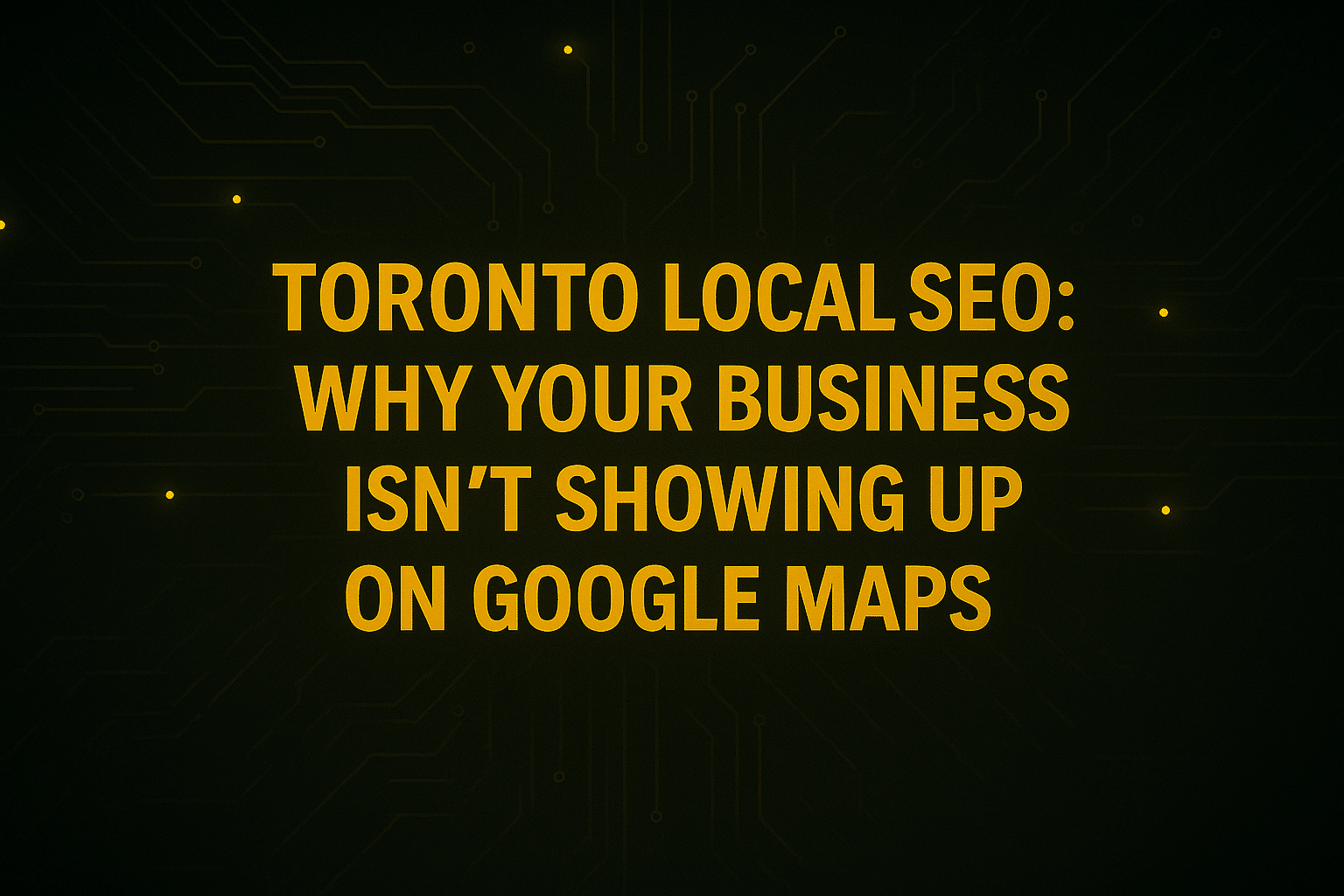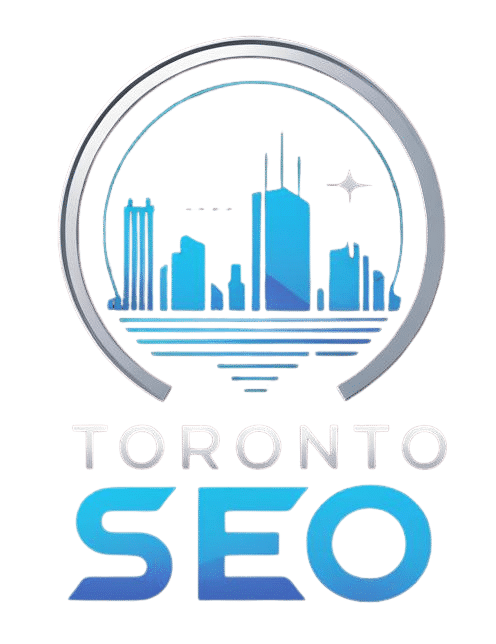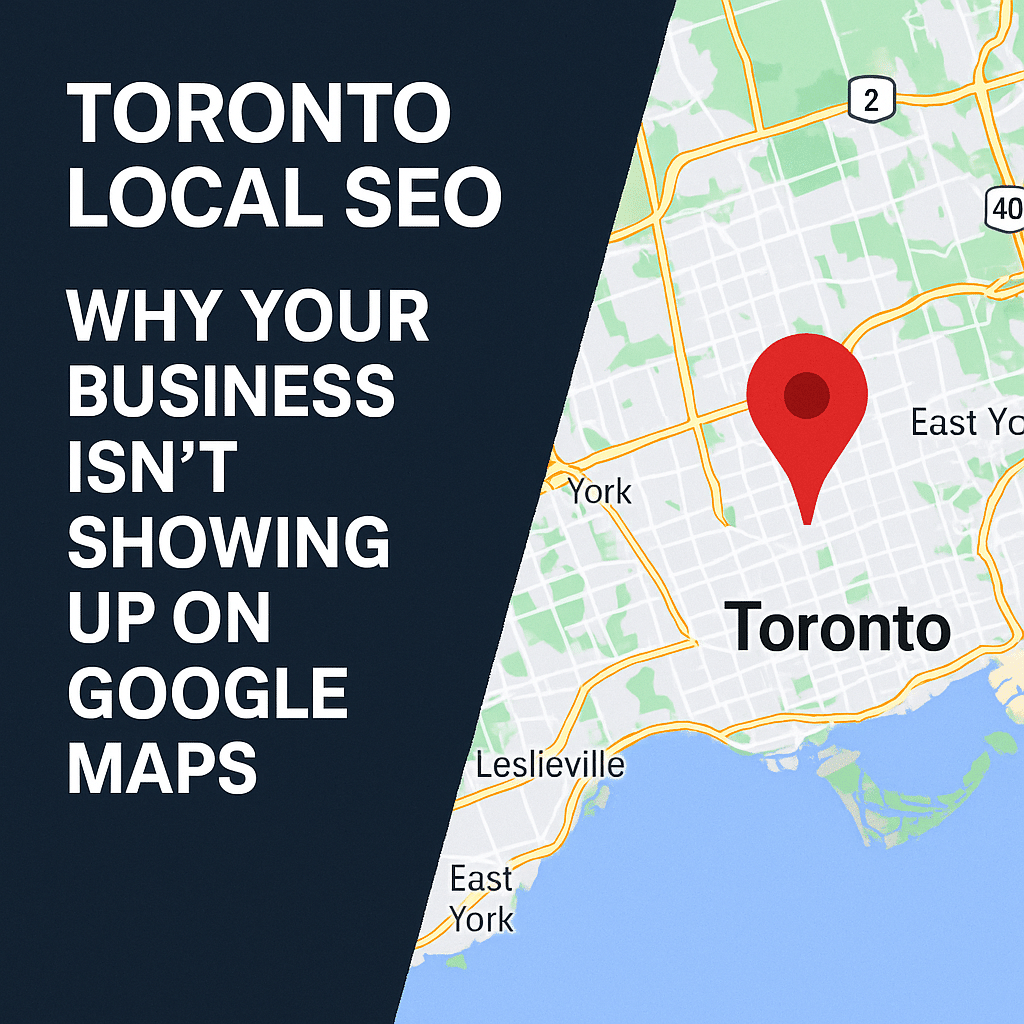
Why Local Visibility Matters More Than Ever in 2025
If your Toronto business isn’t showing up on Google Maps, you’re missing out on the most critical foot-in-the-door for local customer acquisition. Over 85% of consumers use Google Maps to find local businesses, yet many companies still struggle to appear in the coveted 3-Pack. In 2025, Local SEO in Toronto is no longer optional—it’s foundational.
Top Reasons Your Business Isn’t Showing Up on Google Maps
1. Your Google Business Profile (GBP) Isn’t Optimized
Most Toronto businesses that don’t appear on Maps have incomplete or inconsistent Google Business Profiles. This includes:
Missing categories
Lack of services descriptions
No photos or updates
No business hours
Inconsistent NAP (Name, Address, Phone Number) data
Google needs to trust your data to rank it—and trust is built with consistency, completeness, and activity.
👉 Pro Tip: Fill out every section of your profile, including attributes like wheelchair accessibility, online appointments, and product/service offerings.
2. You Lack Local Citations Across the Web
Local citations are mentions of your business’s NAP details on authoritative directories like Yelp, YellowPages, or local Toronto blogs. If Google doesn’t see your business referenced consistently, it’s less likely to rank you on Maps.
We’ve explained why citation building still matters for Toronto local rankings in 2025—because Google uses it as a local trust signal.
Also check out this external resource from Moz on citation importance.
3. Your Website Lacks Localized SEO Content
Local SEO and Google Maps rankings go hand in hand. If your website doesn’t have dedicated local content—such as service pages targeting Toronto neighborhoods (e.g., “Plumbing in Scarborough” or “Massage Therapy in North York”)—Google won’t associate you with specific locations.
What to Include:
Embedded Google Maps with your pin location
City + service-specific landing pages
Reviews/testimonials mentioning Toronto
Location-based schema markup
Internal link idea: Learn more about content optimization and boosting engagement to improve your local rankings.
4. No Reviews—or Worse, Bad Ones
Reviews aren’t just social proof—they’re a ranking factor for Google Maps. Businesses with a higher number of quality, keyword-optimized, and recent reviews rank better.
If your competitors are actively collecting Google reviews and you’re not, you’ll drop fast—even if your business is superior.
✅ Actionable Tip: Launch an automated review request system after every sale or service call.
📘 According to Google’s review guidelines, asking customers for honest feedback is completely within policy—as long as you’re not incentivizing.
5. Your Business Has Proximity Issues
If you’re located far from the user conducting the search, or your service area business (SAB) doesn’t have a clearly defined region, Google might not consider you “local enough.”
To improve proximity signals:
Add service areas within your GBP
Include keywords on your site that mention nearby boroughs or neighborhoods
Get local backlinks from Toronto-based blogs or news sites
We recommend checking out how Toronto businesses are turning to Local SEO in 2025 to handle this exact issue.
6. Spam and Keyword Stuffing in Competitor Listings
It’s common in Toronto for some businesses to rank by violating Google’s guidelines—such as stuffing keywords into their business name (“Best Cheap Plumbing Toronto 24/7”).
You can report spam listings via Google’s Redressal Form to improve your own visibility.
Also, try this: search for your main keyword and analyze the business names that show up. If they violate the naming policy, you can report them—Google often acts fast.
Advanced Fixes to Improve Your Local SEO Performance
Set Up Google Search Console and Track Local Keywords
Use Google Search Console to track how your site is ranking for localized queries like “best dentist Toronto” or “Toronto hair salon.” You’ll gain insight into impressions, CTR, and performance by geo.
Learn more on how to track SEO performance with analytics using tools like GSC and GA4.
Use AI Tools for Keyword Clustering and Content Expansion
Modern SEO is driven by intent clusters, not individual keywords. Use AI-based tools to create content clusters that answer multiple layers of local intent (e.g., “Toronto dental clinic,” “family dentist downtown,” “cosmetic dentistry in the GTA”).
Here’s how Toronto marketing agencies are using AI keyword clustering in 2025.
Backlinks Still Matter—Especially Local Ones
While local SEO is more map-focused, high-authority backlinks from Toronto-based websites still help. Prioritize:
Local news sites (e.g., BlogTO, Toronto Star)
Local chambers and business directories
Sponsoring local events with a backlink
Explore how Toronto SEO agencies build high-authority backlinks without relying on guest posts.
Google Maps Ranking Checklist for Toronto Businesses
| Optimization Element | Importance | Tools Needed |
|---|---|---|
| Complete GBP | ★★★★★ | Google Business Profile |
| Reviews | ★★★★★ | Google Reviews, Podium |
| Local Content | ★★★★☆ | WordPress, Page Builder |
| Citations | ★★★★☆ | BrightLocal, Whitespark |
| Backlinks | ★★★★☆ | Ahrefs, SEMrush |
| Local Schema Markup | ★★★☆☆ | Merkle Schema Generator |
| Service Area Defined | ★★★☆☆ | GBP Dashboard |
Final Thoughts: Map Visibility Requires Precision
Toronto is one of the most competitive digital markets in Canada. If your business isn’t showing up on Google Maps, it’s not just an accident—it’s a symptom of missed optimization.
Local SEO is no longer just about being nearby. It’s about being authoritative, consistent, and locally relevant. If you’re not showing up, chances are your competitors are executing better—and smarter—local strategies.
Learn about the pros and cons of hiring a Toronto SEO expert vs doing it in-house if you’re serious about fixing this fast.
Need help navigating this complex terrain? Contact Us today and let our Toronto SEO specialists put your business back on the map—literally.


